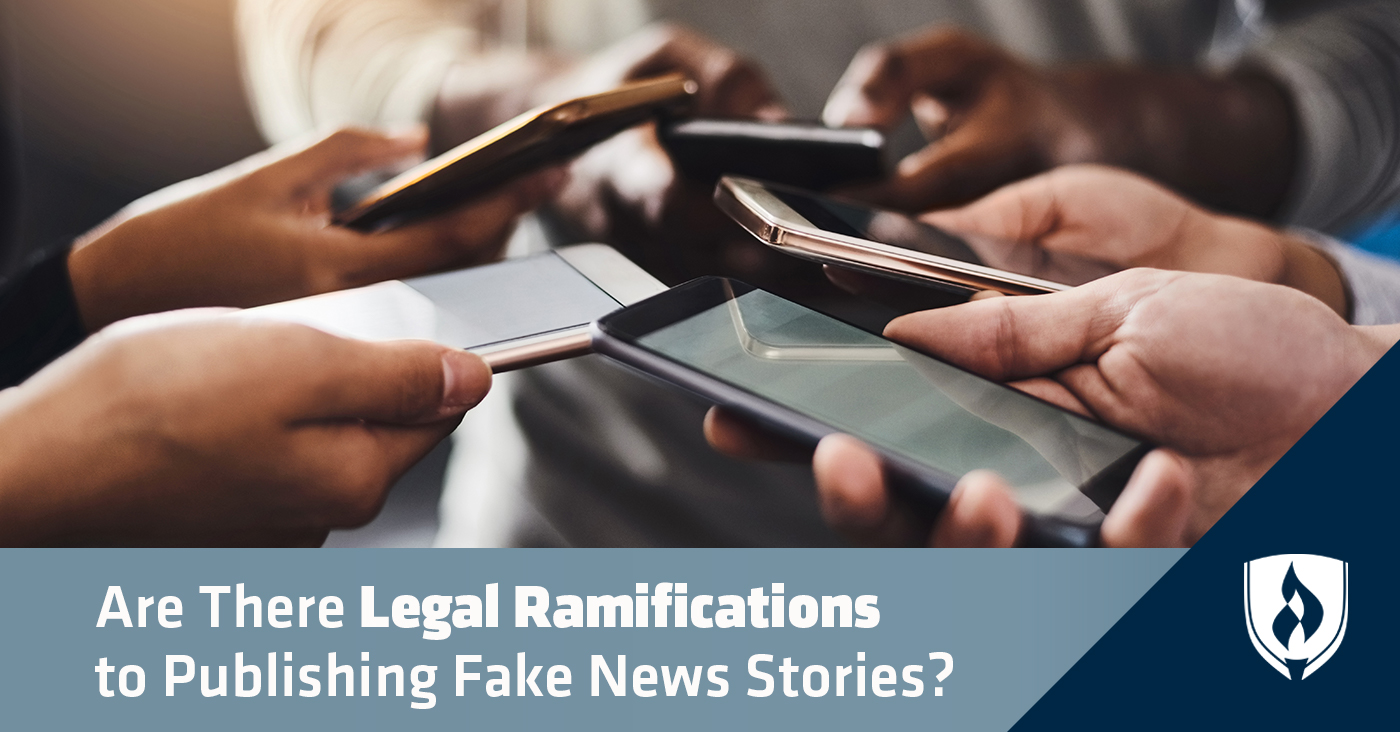
A new buzzword has made its way into the conversations of Americans in the aftermath of the 2016 general election—Fake news.
Like nearly anything related to the 2016 election, it’s a bit of a prickly subject. Given the high stakes of a presidential race, there’s some angst on both sides among voters who feel the spreading of false or misleading news stories has helped or hurt their preferred candidate.
And it’s not just politics. Fake news stories make the rounds covering every topic from celebrities to sports to businesses. So this may have you wondering what can actually be done to stop this—are there legal consequences for those who publish fake news stories?
To help clear up some of the confusion, we connected with legal experts to weigh in on the topic. Keep reading to find out the answers to your lingering questions.
But first…What is fake news?
If you’re the type to dig into the comments section of news articles, you’ll find the waters have been muddied quite a bit about what constitutes fake news. Nearly every news outlet, reputable or not, has been accused of publishing “fake news.”
But in a legal sense, is there a way to define what is fake news? It might seem surprising, but there are currently no laws or precedents that clearly define the concept.
However, any law attempting to ban fake news or treat it as unprotected speech will likely lead to sleepless nights for First Amendment lawyers. “Doing so means addressing many difficult to answer questions,” according to Brendan Beery, professor at Western Michigan University – Cooley Law School.
The difficulty comes when determining where exactly the line should be drawn when defining the term. Is it any story that has the effect of misleading readers? Or is it only stories written with the purpose of being misleading? Can it only be misleading with certain subjects, or is any topic fair game?
“Typically a court will only find that speech is unprotected if it has no value,” Beery explains. “So a perplexing question arises: Does false news … have any value as political, literary, artistic or scientific speech?”
Because of these difficult questions and the ramifications of their answers, attempts to ban the spread of false news with new legislation would likely be at odds with the constitutional right to free speech. For simplicity’s sake, the concept of fake news in this article refers to any news story that intentionally presents and spreads incorrect information.
Can any legal action be taken?
While the law leaves a quite a large opening for fake news publishers to operate, there are still potential areas for legal recourse. In the United States, the most likely route for those who feel they’ve been victimized by a fake news story is a civil suit for defamation. The conditions needed to meet the standards for winning a civil defamation suit are fairly high, particularly when the suit involves a public figure.
What are the conditions for winning a civil defamation suit? All of the following must be true:
- The statement in question is about another person and is provably false.
- The statement is published to a third party who is not the person being defamed. In this context, publishing doesn’t need to be printed, merely “made available” to another person.
- If the statement is of public concern, the publisher must be liable in negligence. Public figures who say they have been defamed also must prove that the publisher of the statement acted with “actual malice” by intentionally publishing something they know to be a lie or through having no regard for whether the statement is true or not.
- The person the statement is made about must be damaged in some way by the statement.
It’s important to keep in mind that the burden for proving all of these conditions falls on the individual suing for defamation, known as the plaintiff. Some factors, particularly the damages and publishers acting with “actual malice,” can be very difficult to prove in these cases.
The bar is set high to protect the press from being punished for making an honest mistake and printing incorrect information. The plaintiff must prove the publisher intended to harm their reputation and didn’t sufficiently check their facts.
Of course, all of this assumes you can get the publisher of this news into the courtroom, which isn’t a given. Many fake news producers operate overseas and can be nearly impossible to track down.
“Assuming you can identify and locate the person making the statement, if they are an individual without a lot of assets or operate out of a shell company, then you will likely not recover much even if you prevail,” says Thomas Simeone of Simeone & Miller, LLP. “Moreover, you will anger them and they may continue to attack you.”
Considering all of this, it seems unlikely that the spread of fake news can be effectively slowed or prevented through the legal system.
So what can be done about fake news?
While the United States’ legal system may not have many appealing avenues for combating fake news, some of these stories’ potential impact can be dampened. For one, social media platforms like Facebook and Twitter can make it harder for these stories to spread.
However, those steps will only go so far. As consumers of online content, we need to place importance in teaching ourselves how to identify questionable news sources and think critically when consuming media, no matter your political leanings.
The rise of fake news stories online has presented an interesting conundrum when it comes to the legal system. But it’s not the only issue of its kind. Learn about some other online obstacles in our article, Has Technology Outrun the Law?
RELATED ARTICLES:




